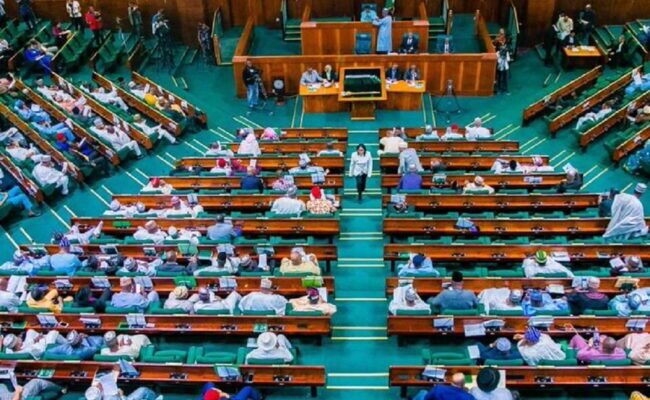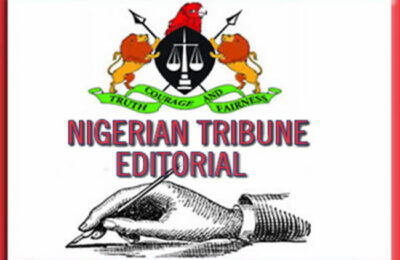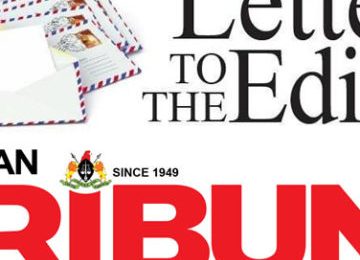•Nigerians spent $98.7bn forex on PTA, education, medical treatment between 2010-2020 — Cardoso
Some members of the House of Representatives on Tuesday expressed grave concerns over the precarious state of the economy, as well as unabated activities of economic sabotage involved in the mopping up of foreign exchange which has impacted negatively on the state of the nation’s economy.

The lawmakers including Hon Dabo Ismaila Haruna, Hon. Ali Madaki, Hon Kingsley Chinda expressed the concerns while interrogating the Minister of Finance and Coordinating Minister of the Economy, Mr Wale Edun; Minister of Budget & National Planning, Senator Atiku Bagudu; Governor of Central Bank of Nigeria (CBN), Mr Olayemi Cardoso and Chairman, Federal Inland Revenue Service (FIRS), Mr Zacch Adedeji during the sectoral briefing on Financial sector Organised at the instance of the House leadership.
While analysing the country’s economic outlook during the session, National Economic Team delegation disclosed that Nigerians spent a total sum of $58.7 billion on Personal Travel Allowances (PTA), $40 billion on education and healthcare over the past 10 years.
In his brief remarks, Hon. Haruna who decried the dwindling fortune of the country’s economy and the endemic corruption within the system, frowned at the inability of the present administration to tackle the challenges head-on.
Haruna cited the CBN report which stated that only 38 per cent of foreign exchange revenues are involved in business transactions while 62 per cent of the foreign exchange transactions are not involved in any business transactions, adding that: “people have been mopping up dollars in Nigeria through transfers.”

While noting that some international organizations including the World Bank have raised similar concerns that if care is not taken, if we inject $1 trillion into the economy, within three months those money will disappear. It will not be in the banks, it will not be with you, CBN, it will be stocked into people’s houses. And you are aware that Nigerians are fighting back now,” he noted.
Some of the issues raised by some of the lawmakers include the removal of forex restrictions imposed on the 49 items by the previous administration in 2015, activities of State Governors who failed to engage administrators for Local Government Government rather than democratically elected chairmen and councillors; how the imposition of 35 per cent import duty on used vehicles will improve local manufacturing of vehicles in Nigeria, relocation of some Departments in CBN to Lagos; accruing economic gains recorded following the removal of fuel subsidy, among others.
In his response, Minister of Finance, Mr Wale Edun noted that there has been increasing in revenue available for the three tiers of government, increase in crude oil production to 1.65mbpd which is expected to keep rising; a decline in the budget deficit from 6.11 per cent in 2023 fiscal year to 3.9 per cent in 2024 while the fiscal deficit is currently below 8.3 trillion in 2023 fiscal year.
He added that NNPCL remains the only importer of petroleum products because of government support following the foreign exchange challenges bedevilling the country, implementation of the national single window policy, to work towards industrialisation by ensuring adequate energy supply, strengthen various Institutions, as well as work towards ensuring single exchange rate.
He also hinted at the plans by the National Council on Privatisation (NCP) to review the Bank of Industry which he noted is financially distressed, with the view to make it more effective as well as look into the efficiency of NIRSAL, in order to make them fit for purpose.
In his earlier presentation, CBN Governor, Mr. Yemi Cardoso explained that the apex bank’s bold reforms are underway across different segments of the economy, though initially challenging, are aimed at addressing these challenges sustainably.
The CBN Governor who assured the Parliament of economic recovery, disclosed that the country recorded $844 million in transactions as of the close of business on Monday, 5th February, 2024, indicating the investors’ confidence in the nation’s economy.
He added that Nigerian National Petroleum Corporation Limited (NNPCL) has also commenced the process of transferring its accounts to the apex bank in line with President Bola Ahmed Tinubu’s directive, adding that all the MDAs have also been directed to do the same without further delay.
While acknowledging that the cost of living and currency exchange rates remain, he averred that Governments must grapple with rising fiscal pressures, necessitating credible medium-term fiscal frameworks to effectively manage debt burdens.
Cardoso who acknowledged that the “Nigerian foreign exchange market is currently facing increased demand pressures, causing a continuous decline in the value of the naira,” however in response to the removal of restrictions placed on the 49 items argued that it is wrong for the apex bank to say that the 49 items are prohibited from the list of items being imported into the country.
According to him, some of the factors contributing to this situation include speculative forex demand, inadequate forex supply due to non-remittance of crude oil earnings to the CBN, increased capital outflows, and excess liquidity from fiscal activities.
He said: “permit me to say that put simply, the exchange rate is determined by the dynamics of supply and demand for a product or service. In essence, similar to the pricing of cows or cars, the value of the US Dollar in Nigeria is determined by the balance of US Dollars entering the country and the demand for US Dollars among Nigerians. Applying this demand and supply principle, let’s examine how the exchange rate has performed in recent years. The exchange rate in Nigeria has increased/depreciated due to the simultaneous occurrence of two factors: a decline in the supply of US Dollars coinciding with a surge in the demand for US dollars.
“Looking at the demand side of the exchange rate, it’s important to note the growing number of Nigerian students studying abroad. In the 1980s and 1990s, the need for US Dollars for their living expenses was minimal. However, recent data shows a significant change.
“According to UNESCO’s Institute of Statistics, the number of Nigerian students abroad increased from less than 15,000 in 1998 to over 71,000 in 2015. By 2018, this figure had reached 96,702 students, as per the World Bank. Another report projects the number of Nigerian students studying abroad to exceed 100,000 by 2022. Additionally, the UK’s Higher Education Statistic Agency noted a 64% increase in Nigerian students studying in the country, rising from 13,020 in the 2019/2020 academic session to 21,305 by the 2020/2021 session.
“Given this data, it’s crucial to highlight that between 2010 and 2020, foreign education expenses amounted to a substantial US$28.65 billion, as per the CBN’s publicly available Balance of Payments Statistics. Similarly, medical treatment abroad has incurred around US$11.01 billion in costs during the same period. Consequently, over the past decade, foreign exchange demand for education and healthcare has totalled nearly US$40 billion. Notably, this amount surpasses the total current foreign exchange reserves of the CBN. Mitigating a significant portion of this demand could have resulted in a considerably stronger Naira today.
“Personal Travel Allowances have accounted for a total of US$58.7 billion during the same period. Notably, between January and September 2019, the CBN disbursed US$9.01 billion to Nigerians for personal foreign travel.
“Continuing on the topic of the demand for US Dollars, Nigeria’s annual imports, which require dollars for payment, amounted to US$16.65 billion in 1980. By 2014, the annual import expenditure had significantly surged to US$67.05 billion, although it gradually decreased to US$54.71 billion as of last year. Similarly, food imports escalated from US$2.63 billion in 1980 to US$14.84 billion in 2019.
“In 1980, more than 75 per cent of the vehicles used in Nigeria were domestically produced by companies like Volkswagen in Lagos, Peugeot in Kaduna, and others. Presently, over 99 per cent of the cars driven are imported, necessitating dollar payments. Similarly, in 1980, the majority of the clothing worn was sourced from Nigerian textile mills in Funtua, Asaba, Kano, Lagos, and various other towns and cities. Today, nearly all the clothing worn is made from imported fabrics.
“Given the substantial demand for education, healthcare, professional services, personal travel, and similar needs, the exchange rate is bound to face ongoing pressure.
“On the supply side of the exchange rate, to bolster the inflow of US Dollars into a country, the economy must “earn” these dollars through exports, whether oil or non-oil or by attracting foreign investments A robust economic foundation is essential to produce goods and services that the global market is willing to pay for in US Dollars. When such supply surpasses demand, the exchange rate appreciates, causing the price of the dollar to fall. Unfortunately, in Nigeria, the contrary has taken place.
“In 1980, our import expenditure stood at US$16.65 billion, while our exports amounted to US$25.97 billion, resulting in a surplus of US$9.32 billion. Thus, during that year, we managed to fulfil the demand for US Dollars from our existing supply and still had over US$9 billion in surplus. In such a situation, the exchange rate (the value of the US Dollar) would not increase because, similar to any commodity, its supply surpassed the demand. Moreover, from 2003 to 2013, we experienced a surplus of US$331.73 billion in the economy, with oil exports alone contributing over US$7.98 billion. This surplus of dollars would typically stabilize the exchange rate, leading to a “strong” Naira.
“Regrettably, over the past 12 years, oil exports, constituting over 90 per cent of our foreign exchange earnings, have declined from US$93.89 billion in 2011 to US$31.4 billion in 2020.
“From the aforementioned points, we can infer that the genuine issue impacting the exchange rate is the simultaneous decrease in the supply of, and increase in the demand for, US Dollars. It also seems that the task of stabilizing the exchange rate, while an official mandate of the CBN, would necessitate efforts beyond the Bank itself and indeed to an attitudinal change of all our citizens.”
In the bid to tackle the endemic corruption in the system, he disclosed that the apex bank is working in collaboration with the Federal Ministry of Finance as well as the Economic and Financial Crimes Commission (EFCC).
While responding to the issue of the recent relocation of some departments in the CBN to Lagos State as raised by Hon. Aliyu Madaki, Mr. Cardoso argued that: “nothing political about it.”
Cardoso who noted that most of the financial institutions are based in Lagos State, observed that the apex bank took the decision with a view to strengthen the supervision of financial institutions across the country, hence the need to increase the bank supervision by moving the Department closer to the banks.
He also maintained that the apex bank is not reluctant to wield the big stick and hammer on any erring Bank that violates the financial regulations, just as he assured that frantic efforts being made to address various socioeconomic challenges will begin to yield positive results in the nearest future.
In his part, Chairman, Federal Inland Revenue Service (FIRS), Mr. Zacch Adedeji disclosed plans to ensure all Nigerians above 16 years are captured into the National Identification Number (NIN) as part of ongoing efforts toward boosting revenue drive as well as ensure deployment of relevant technology for revenue collection.







